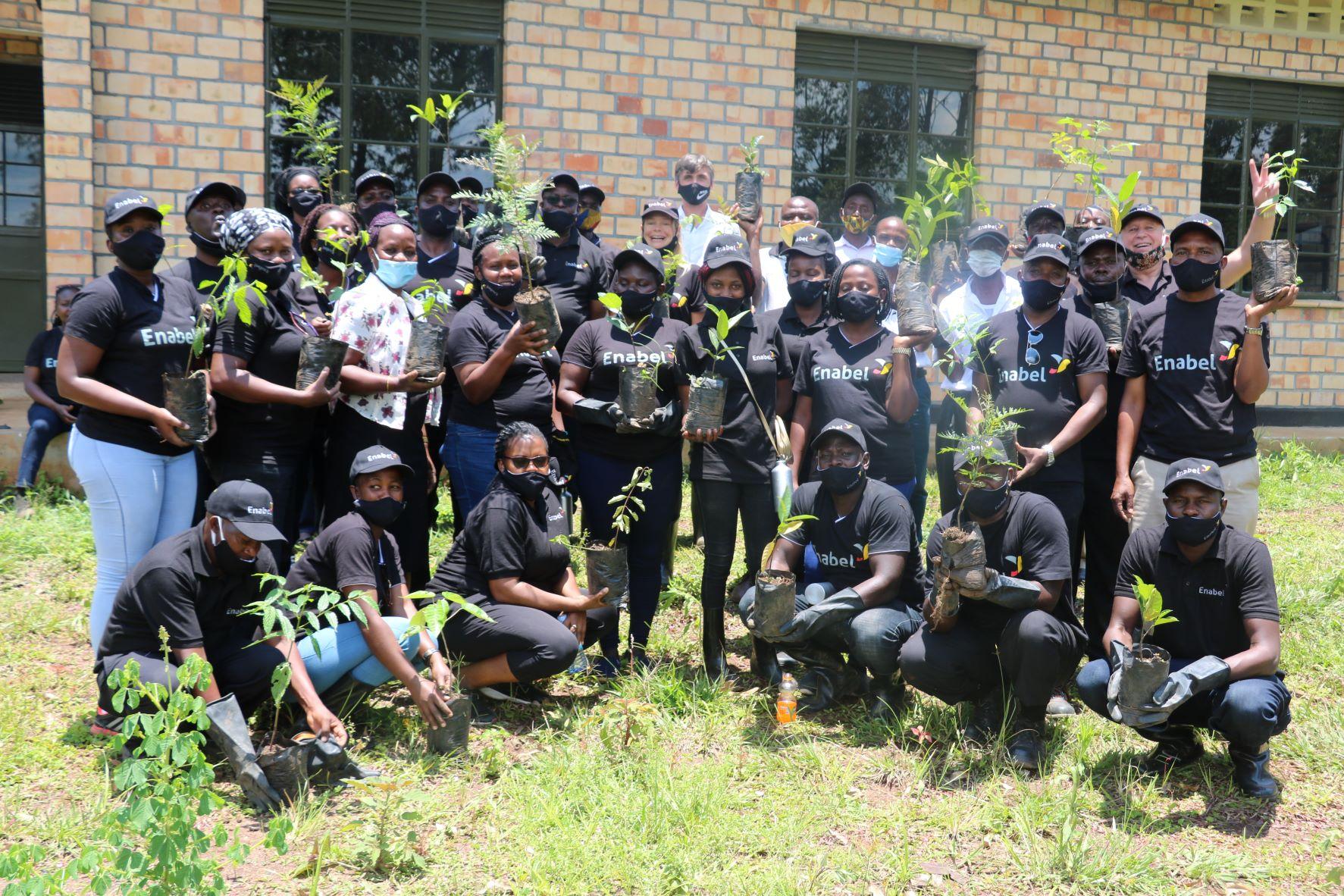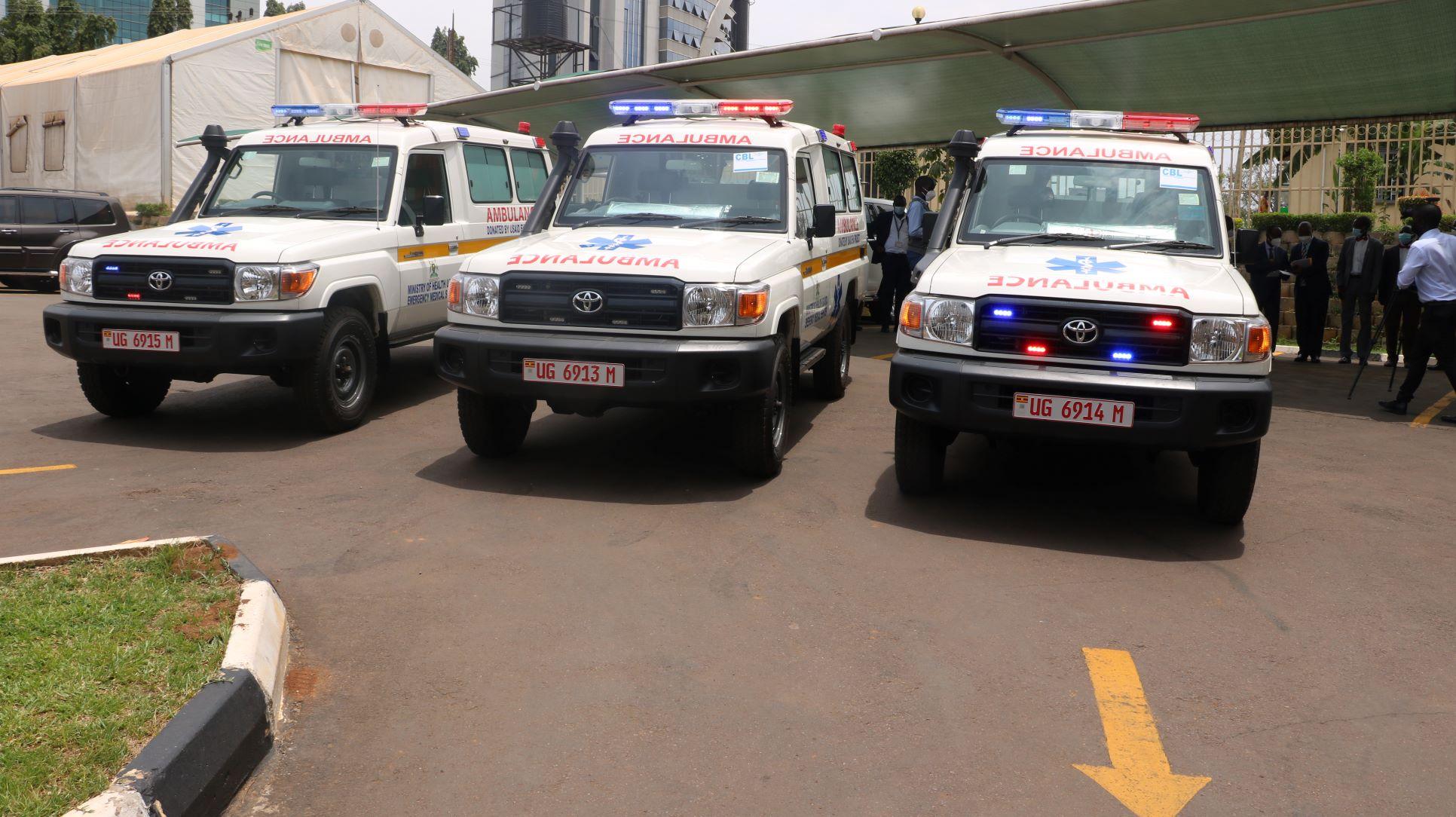Rechercher
Affichage de 1650 à 1665 sur 3127 actualités
-
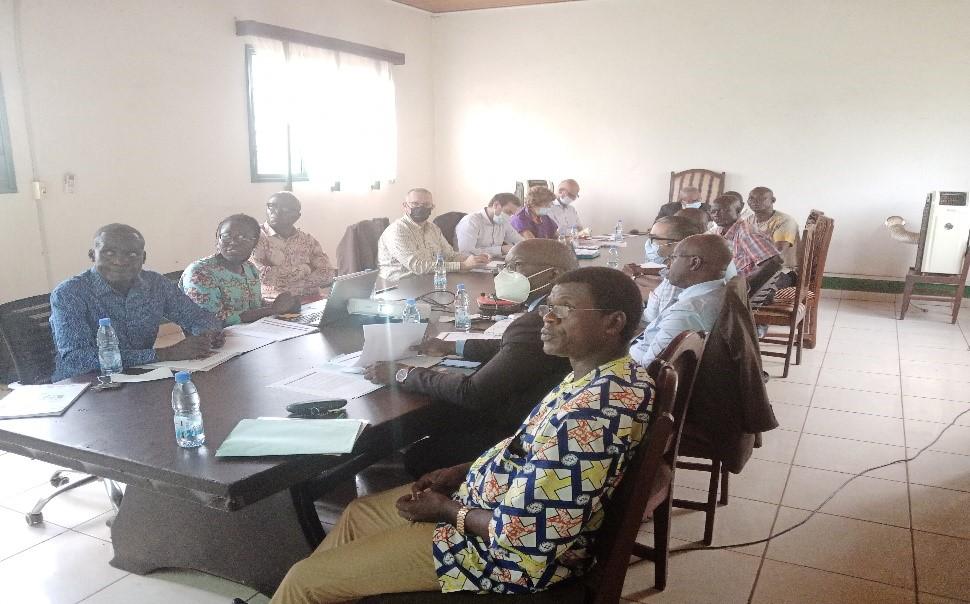
RCA: Première Réunion du Comité de supervision technique
Grâce MALI FAIDA | 12/04/2022
a première réunion du comité de supervision technique du Programme d’appui au Développement Rural (#DEVRUR II : programme mis en œuvre par Enabel et financé par le fonds bêkou pour le compte de l’année 2 (2022) a eu lieu le 9 mars 2022 dans la salle de conférence du Ministère de l’Agriculture et du Développement Rural (MADR). Les parties prenantes ont échangé sur les points suivants : - Suivi des décisions de comité de supervision technique (année1)- Rappel de la stratégie opérationnelle- Agropoles implantées- Résultats de l’années1- Suivi budgétaire au 31 Décembre 2021- Planification opérationnelle 2022- Planification financière 2022- Gestion des risques et des problèmes- Proposition des décisions soumises à l’approbation du Comité de Supervision technique.Les partenaires ayant pris part à cette réunion : Représentants de la Délégation de Union Européenne en RCA, Représentants du Ministère de l’Agriculture et du Développement Rural, Représentant du Ministère de l’Economie, du Plan et de la Coopération, Représentant du Ministère de l’Education Nationale, Représentant du Ministère de l’Elevage et de la Santé Animale, Représentant du Ministère des Finances et du Budget.La prochaine réunion est prévue dans trois (03) mois.
-
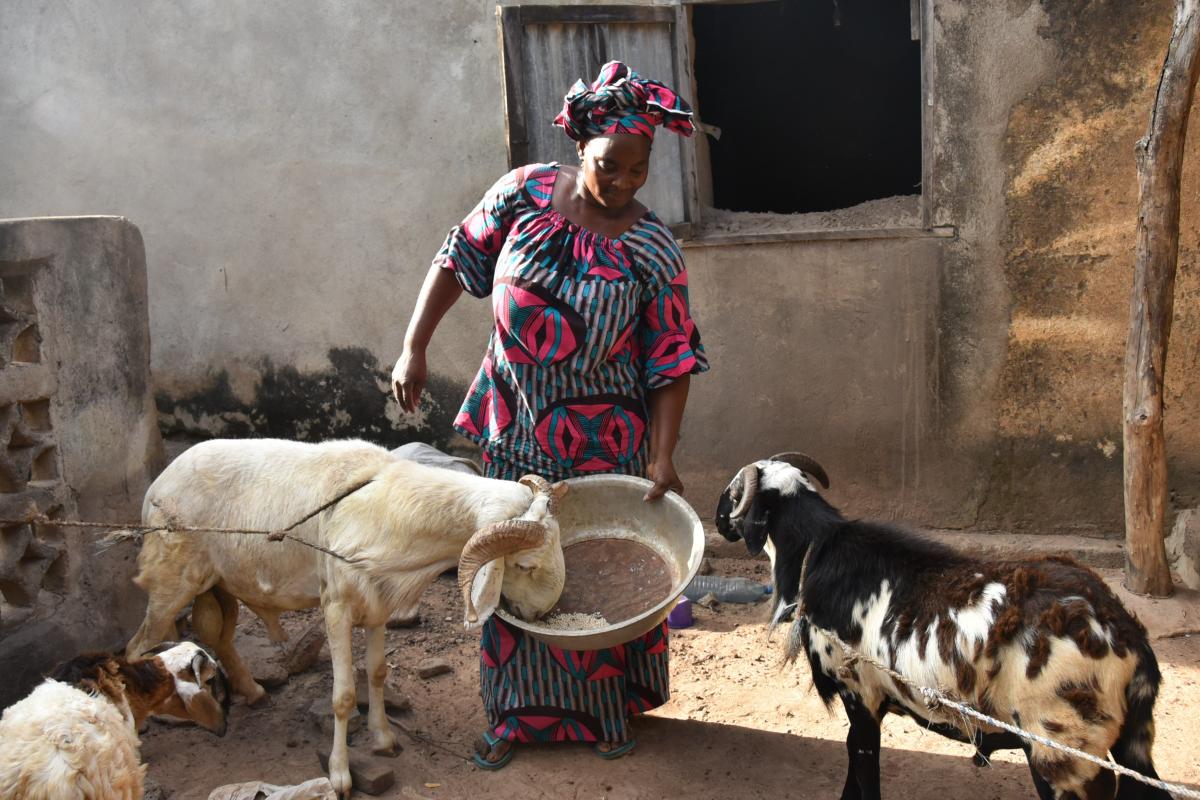
Mali: Autonomisation des femmes éleveurs de petits ruminants à travers des champs écoles
Nènè TRAORE | 12/04/2022
L'élevage est un secteur essentiel au Mali, c'est la principale source de revenus pour plus de 30% de la population et représente 14% du PIB (INSAT2017) . Au Mali, de nombreux éleveurs ne tirent pas le maximum de profit de leurs activités. Cela pour plusieurs raisons, entre autres, la raréfaction des ressources alimentaires, la faible connaissance des techniques résilientes, le manque d'optimisation des bonnes techniques d'élevage, par exemple l'embouche. Le changement climatique a exacerbé la vulnérabilité des éleveurs, les pratiques résilientes doivent être vulgarisées et encouragées. L'embouche d'une manière générale et celui des petits ruminants (moutons et chèvres) est une pratique d'élevage, qui optimise l'apport alimentaire et réduit la mobilité des animaux, il permet d'engraisser plus rapidement le bétail et constitue un moyen rapide de gain monétaire pour les éleveurs. Une fois bien engraissé les animaux se vendent mieux. L'embouche séduit de plus en plus d'éleveurs au Mali. Mais force est de constater que de nombreux éleveurs ne manifestent pas de connaissances reconnues, adéquates et adaptées au changement climatique.Le Projet d'Appui au Renforcement de l'Elevage et de l'économie pastorale dans la région de Koulikoro (AREPK) initié par Enabel dans sa mise en œuvre de l'approche des « champs-écoles agro pastoraux (CEAP) » qui vise à valoriser l'embouche et à faciliter le partage des connaissances entre les couples, une formation des éleveurs dans sa zone d'intervention. De ce fait, les services locaux de production et d'industrie animale, les mairies ont sélectionné 32 maîtres formateurs selon des critères bien définis. C'est ainsi que Mme Sangaré Nana Dembélé éleveur depuis six ans s'est distinguée lors de ces formations. « Avant la formation sur les techniques d'embouche et les bonnes pratiques d'élevage,. A vec cette formation, j'ai appris des techniques bien précises pour faire l'embouche : à savoir la santé animale, la valorisation de la paille qui constitue un aliment très riche pour l'animal, les techniques de fabrication de pierre à lécher, ainsi que la gestion financière mon activité. A son retour dans son terroir Nana a pu mettre en place un CEAP constitué de vingt autres femmes avec qui elle a acquis ses connaissances partagées et les a mis en pratique. Au cours des formations, les femmes ont pu apprendre à produire de l'aliment bétail et à rationaliser les aliments pour l'animal tout en maitrisant les itinéraires techniques de l'embouche.Ensemble elles ont pu ouvrir un compte bancaire commun au nom du CEAP qui leur a permis, d'acheter des animaux, de les engraisser et de les revendre avec une plus-value. Les membres du CEAP ont ainsi pu bénéficier d'un crédit qu'ils ont pu rembourser au bout des deux premiers cycles(6mois). L'octroi du crédit a été facilité par AREPK . En moyenne chaque femme du CEAP a acheté 3 moutons qu'elle a pu revendre lors de la fête de Tabaski Nana après cette opération s'est sentie très valorisée d'avoir aidé d'autres femmes, et surtout de savoir qu'il y a une autre façon de faire de l'élevage. Selon elle «Avant la formation acquise par AREPK, je n'avais jamais formé quelqu'un. Aussi je n'avais pas le réflexe de faire appel à un vétérinaire c'était uniquement en cas de maladie de l'animal que je faisais recours au vétérinaire. Mais avec cette nouvelle façon de faire, un passe vétérinaire consulter nos animaux qui sont en atelier d'embouche tous les 15 jours. Cela nous a permis de mettre sur le marché des animaux avec un meilleur embonpoint et en bonne santé. Avant ma formation, je vendais trois béliers par an.Aujourd'hui forte de mes expériences en alimentation et en santé des animaux je vends au minimum trois têtes par cycle(3 mois), Avec les adhérentes de notre CEAP, nous sommes à présents animés d'une volonté d'augmenter le nombre d'animaux par cycle . »A travers cette formation, Nana a vu la professionnalisation de son activité d'élevage et parvient à en tirer des bénéfices. En plus de l'embouche ovine, et caprine (moutons-chèvres) elle pratique désormais l'embouche bovine (vaches). « En deux ans j'ai acquis quatre bœufs et c'est grâce à cette activité que j'ai pu inscrire deux de mes enfants dans une école privée, ce qui leur garantit un meilleur avenir ». des revenus notamment à travers la production et la vente de bloc multi nutritionnels (pierre à lécher) que j'ai appris à fabriquer au cours de la formation, dit elle.Dans l'avenir Nana compte encore diversifier ses activités notamment par la commercialisation d'aliments de bétail, de pierre à lécher, et de stockage de fourrage, en conservant les bonnes pratiques acquises. Elle entend contribuer à l'autonomisation d'autres femmes par la pratique de l'embouche, contribuant ainsi à l'atteinte à certains objectifs de développement durable (ODD). Elle conserverait que les femmes formées soient des relais auprès d'autres femmes. Avec l'installation de ces Champs écoles pastoraux, on constate une amélioration des revenus des éleveurs emboucheurs et la disponibilité d'une viande de meilleure qualité sur le marché.
-

Transfert de Compétences : Enabel accompagne le Port Autonome de Cotonou
Reece-hermine ADANWENON | 11/04/2022
Fidèle à son engagement d’accompagner le Port Autonome de Cotonou dans l’amélioration de ses performances, Enabel au Bénin à travers le projet PASPort a contribué à la formation de 12 agents de l’institution. Provenant des structures comme la Direction des Affaires Juridiques et du Contentieux (DAJC), Direction de la Cellule du Contrôle des Marchés Publics (DCCMP), Direction Commerciale et du Marketing (DCM), Direction de la Personne Responsable des marchés Publics (DPRMP), ces agents ont bénéficié d’un parcours d’acquisition de compétences délivré en 3 phases. Démarrée en janvier 2021 et clôturée en décembre 2021, cette formation leur permettra de réduire et de mieux gérer les risques contentieux dans le cadre des contrats de Partenariat Public-Privé (PPP) et les contrats de type Fidic (Fédération internationale des ingénieurs-conseils). Réduire le nombre de personnes travaillant sans un contrat au Port de Cotonou ; Réduire les poursuites judiciaires liées à la mauvaise gestion des concessions ; Réduire les dépenses liées aux prestations des avocats pour défendre le port au cours des procès ; Établir les fiches d’information par contrat de concession. Prévenir, assurer une veille juridique et la conformité des actes posés face à la légalité.Tels sont entre autres les objectifs que vise Enabel en contribuant à ces formations juridiques. Pour Joris Albert THYS, Directeur Général du Port Autonome de Cotonou, cette formation fait partie d’une série d’actions appuyée par Enabel à travers le projet PASPort pour améliorer la performance du Port qui est engagé dans une dynamisation de ses ressources humaines.Ce parcours de formation a été délivré par un consortium d’avocats en 3 phases à savoir :- Le diagnostic (voir le niveau du public cible pour mieux adapter le contenu de la formation)- La Formation (dérouler la phase théorique de la formation)- L’accompagnement des auditeurs dans leur milieu de travail et faire le focus sur les réelles difficultés que rencontrent ces agents afin de les amener à mieux y répondre.Plusieurs thématiques ont été abordées lors de la formation telles que les principes de base de la gestion des Contrats de Partenariat Public-Privé (PPP), la revue des lois sur les marchés publics ; les règles d’arbitrage, la revue des contrats de domanialité publique…La remise des certificats aux participants a eu lieu le mercredi 2 mars 2022 à la salle de réunion du Port Autonome de Cotonou.Dans cette vidéo, écoutons les témoignages de quelques bénéficiaires de ce parcours d’acquisition de compétences dans le domaine juridique.
-
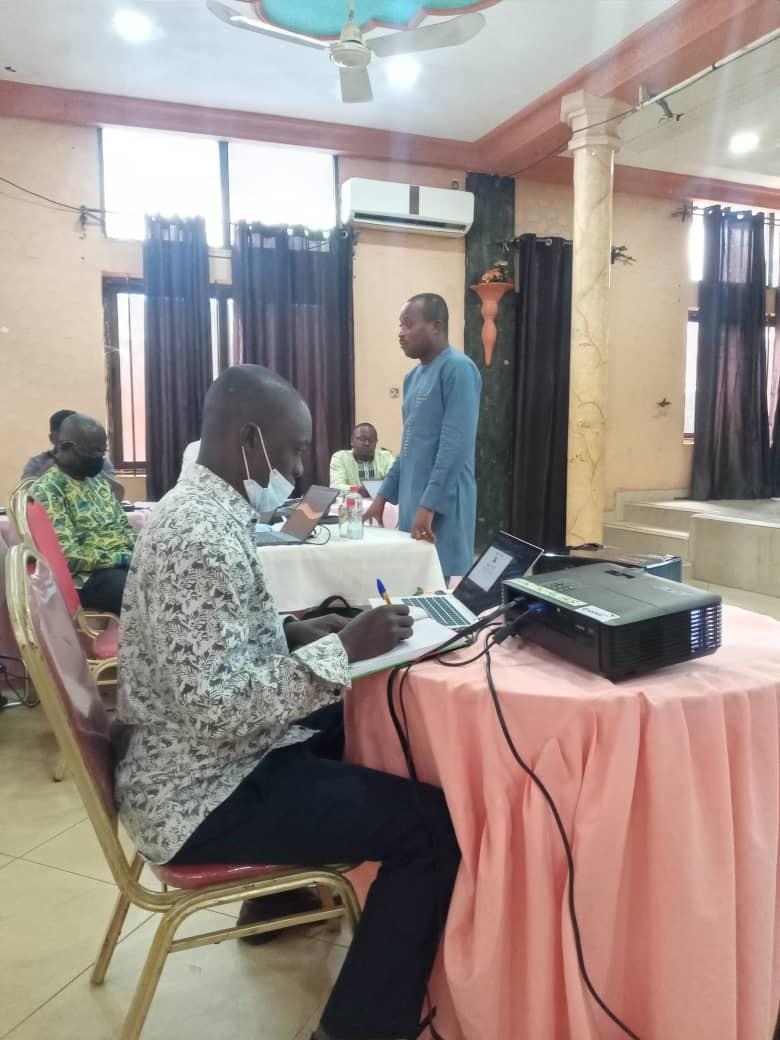
ARISA-B accompagne le MAEP et dote les Communes d’un guide méthodologique d’élaboration des Plans Communaux de Développement Agricole (PCDA).
Reece-hermine ADANWENON | 10/04/2022
L’approche développée par ARISA-B pour l’élaboration du PCDA est basée sur la co-production d’une démarche en plusieurs étapes basées sur un processus participatif et inclusif à savoir :- le guide méthodologique d’élaboration des politiques et stratégies du Bénin ;- la version élaborée de la démarche méthodologie proposée par la Direction de la Planification, de l’Administration et des Finances (DPAF) ;- les résultats de l’étude d’évaluation participative réalisée par la DDC pour capitaliser les expériences de terrain menées par les interventions de la DDC dans les Communes du nord-Bénin.Le PCDA est le document qui alimente et affine le Plan de Développement Communal (PDC) sensible à l’agriculture. Son élaboration tient compte des spécificités et potentialités agricoles de chaque Commune. Elle s’arrime également à la vocation agricole du Pôle de Développement Agricole (PDA) dans un contexte de réforme axée sur la territorialisation agricole et l’approche de promotion des chaînes de valeur ajoutée.Porté par le Ministère de l’Agriculture, de l’Élevage et de la Pêche (MAEP), le processus d’élaboration du PCDA réunit les représentants de toutes les parties-prenantes au processus de planification territoriale don’t les Organisations Professionnelles Agricole (OPA) et les Organisations Interprofessionnelles (OIP), les Communes, les Agences Territoriales de Développement Agricole (ATDA), les Directions Départementales de Agriculture, de l’Élevage et de la Pêche (DDAEP) et les Directions Départementales du Développement (DDD). Il permet de disposer d’une démarche méthodologique d’élaboration des PCDA qui sera transformée en guide afin d’espérer des PCDA orientés sur la promotion des filières conformément à la réforme du secteur agricole au Bénin. Le processus bénéficie aussi de l’assurance-qualité du ministère du développement en matière de caractéristiques et de principes cardinaux qui régissent l’élaboration de document de stratégie et de politique en République du Bénin. Selon Issifou Agboguidi, Chef du Service de Développement Local et de la Planification (SDLP) de Bassila, le guide méthodologique mis à la disposition des différentes directions permettra de faciliter et de corriger les dysfonctionnements observés sur le terrain lors de l’élaboration des Plans Communaux de Développement (PDCA). « La Commune de Bassila dispose d’un PCDA qui a été élaboré à la va-vite. Du coup, nous nous posons vraiment assez de questions sur son opérationnalisation. La commune s’était plainte, et il a dû être organisée une concertation avec le service de la planification et la cellule communale afin de colmater les brèches. Si la méthodologie existait on n’aurait pas assisté à ce genre de choses » ajoute-t-il.
-
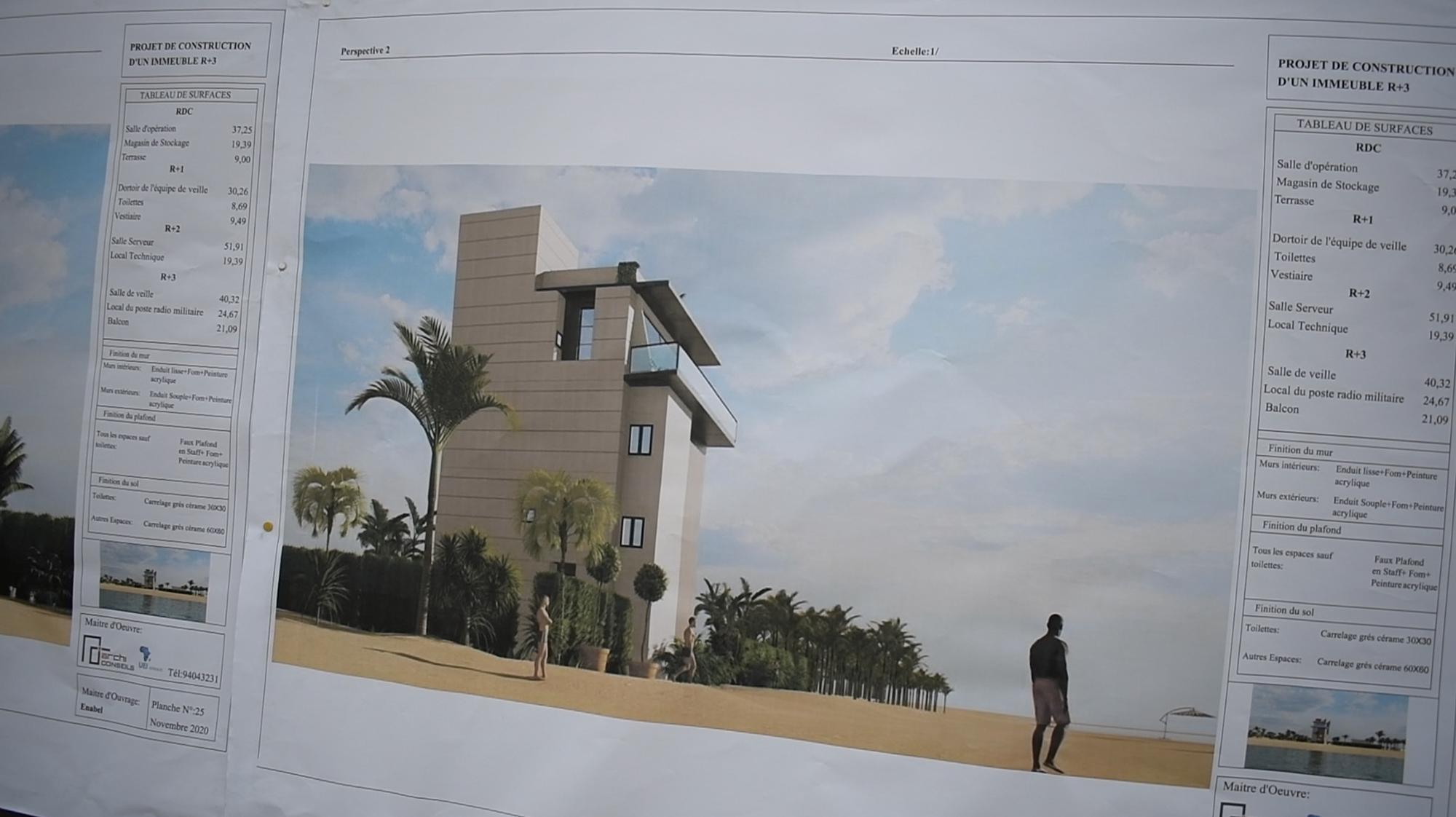
Sécurité et sûreté Maritime au Bénin : Enabel dote la base navale d’un sémaphore
Reece-hermine ADANWENON | 08/04/2022
D’un coût global de 300 mille euros soit environ 197.000.000 de Fcfa, la construction de cette infrastructure va permettre d’observer un plus grand nombre d’actes suspects ou illicites venant de la partie Est du pays et va réduire progressivement ces événements.Un sémaphore est en effet, un poste de défense établi sur la côte, chargé de surveiller les approches maritimes et de signaler par signaux optiques toute activité ennemie. Le Bénin en dispose deux, une à la base navale de Grand-Popo et une à la base navale de Cotonou. Il restait alors la base navale de Sèmè-Kpodji, à l’Est du pays d’où provienne d’ailleurs la plupart des menaces. Ce besoin a fait l’objet d’une requête de la part de l’Etat-major de la Marine nationale qui a été acceptée par l’Agence belge de développement (Enabel) à travers le Projet d’Appui au Développement du Secteur portuaire (PASPort) depuis 2019. Dans son allocution, le représentant de l’Ambassade de Belgique au Bénin, Martin Deroover a souligné que le projet s’inscrit dans la volonté de l’actuel gouvernement du Bénin de faire davantage du port de Cotonou un levier essentiel du développement du pays. Pour lui, moins de sécurité dans les eaux béninoises entraînerait une baisse de la fréquentation du port de Cotonou qui annihilerait tous les efforts faits en aval de la chaîne portuaire. C’est conscient de cela que l’État béninois, dans le souci de remplir sa fonction régalienne de garantir la sûreté dans ses eaux territoriales, a mis en place un mécanisme pour une meilleure surveillance de ses eaux maritimes. C’est ainsi que Enabel, à travers son projet PASPort, a accepté la requête de construction d’un sémaphore qui comprend un rez-de-chaussée et trois étages mais aussi son équipement entier, a laissé entendre Martin Deroover.Pour Jean Léon Olatoundji, chef d’Etat-major adjoint des Forces armées béninoises, face au défi sécuritaire, le Bénin a besoin d’une couverture totale de surveillance de son espace maritime, d’où la création de la base navale de Sèmè-Kpodji, gage de sûreté et de surveillance de l’espace maritime. Selon lui, grâce à la construction de ce sémaphore, la Marine pourra mieux surveiller le trafic maritime dans l’espace Est. Il a dit toute la gratitude de la Marine nationale au Royaume de Belgique.Le préfet maritime, le capitaine de vaisseau Fernand Maxime Ahoyo, a rassuré de l’existence d’une compétence nationale, les guetteurs sémaphoriques, formés pour l’utilisation des systèmes de radar et de la communication qui vont procéder 24h sur 24 à la surveillance de la façade Est.Les travaux de construction du sémaphore dureront 7 mois.
-
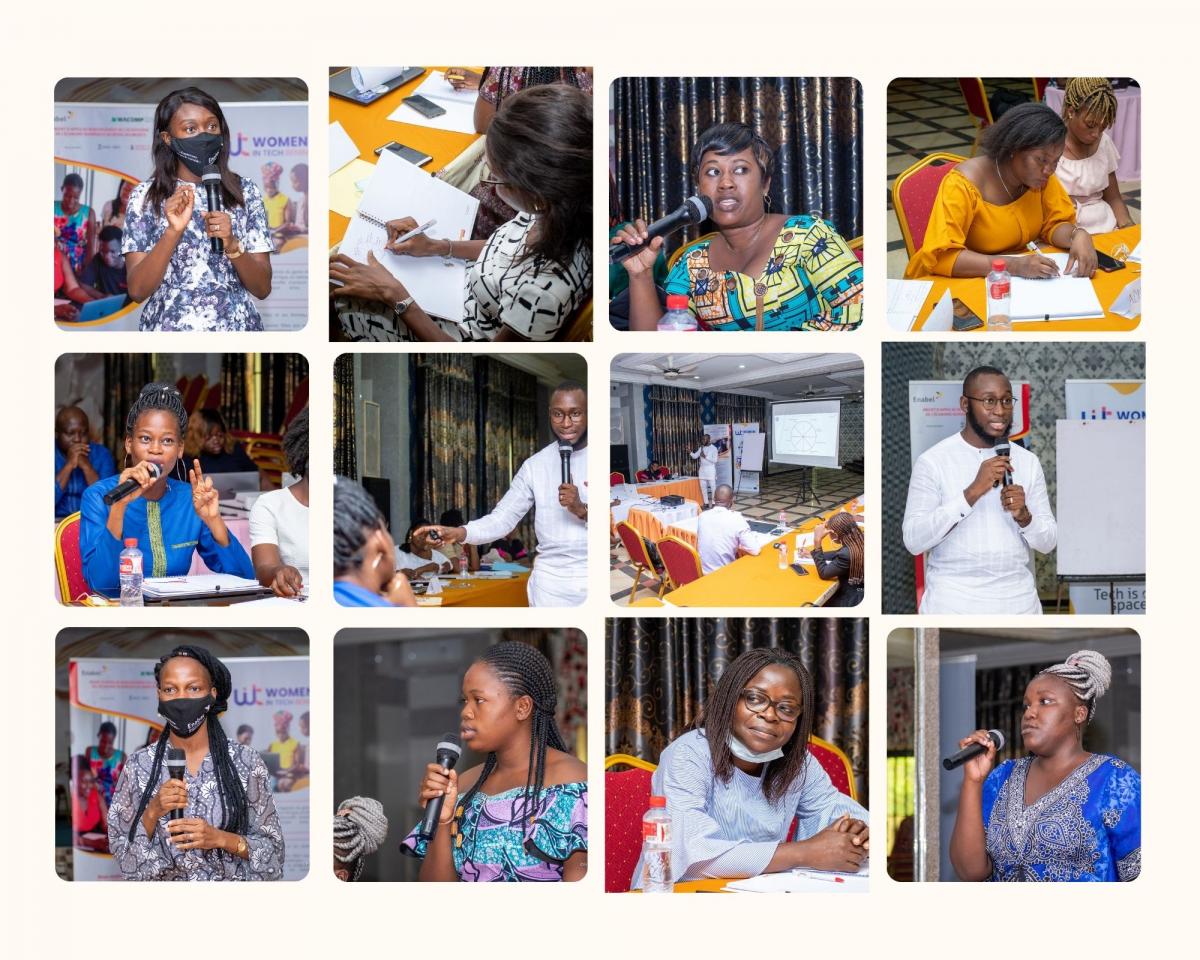
Les femmes de la communauté WIT à l’école du leadership
Reece-hermine ADANWENON | 08/04/2022
Former les femmes de la communauté WIT sur le leadership féminin et leur donner les outils nécessaires pour leur permettre d’appliquer les connaissances acquises. Tel est l’objectif de l’atelier de renforcement des capacités qui s’est tenu à Bohicon du 29 au 31 mars 2022. Venues de diverses localités du Bénin (Nord au Sud), une quarantaine de femmes ont participé à cet atelier organisé dans le cadre de la célébration de la Journée Internationale des Femmes.Avec l'expertise de Monsieur Sedami Agboton, Coach, Speaker & Trainer certifié par l’expert N° 1 en Leadership John C. Maxwell, les participantes ont été formées sur les bases et techniques pour développer leur leadership. Partant des clarifications du concept en passant par l'appréhension de certaines doctrines du leadership pour déboucher sur des exercices pratiques d'éveil et de compréhension du sujet, le coach formateur a permis à chacune des participantes d'évaluer de plus près leur statut et sens du leadership.Pour les participantes, cette formation était plus que nécessaire afin de leur redonner confiance et de les amener à mieux gérer les différentes structures. Elles sont restées unanimes sur l’importance des acquis reçus au cours de la formation. Pour la plupart, ce fut une formation intense certes, mais instructive.Pour Félicité Ananou Digital Manager à She is the Code: « la formation sur le leadership a été très constructive et instructive. J’ai appris des choses relatives au leader/leadership que je ne connaissais pas. Ce qui va me permettre de gérer convenablement une communauté de groupe de personnes. C’était intense comme formation, de la théorie à la pratique. J’ai adoré ». Gloria Ahonoukoun coordonnatrice du programme WHISPA à EtriLabs, dira pour sa part que : « la formation était très intéressante et participative. Elle m’a permis non seulement de mieux cerner la notion de leadership, mais également de savoir mieux l’appliquer pour faciliter mes relations avec autrui afin d’impacter au sein de ma communauté ».Cet atelier a été organisé avec l’appui financier et technique de l’Union Européenne et d’Enabel à travers le projet DigiBoost. DigiBoost est un projet de renforcement et de consolidation de l’écosystème numérique au Bénin à travers des appuis aux structures d’accompagnement des startups (incubateurs, accélérateurs, fablabs, espaces de coworking, entre autres) ainsi qu’aux relations entre les acteurs au sein et en dehors de l’écosystème béninois, mis en œuvre par Enabel, et financé par l’Union Européenne.
-
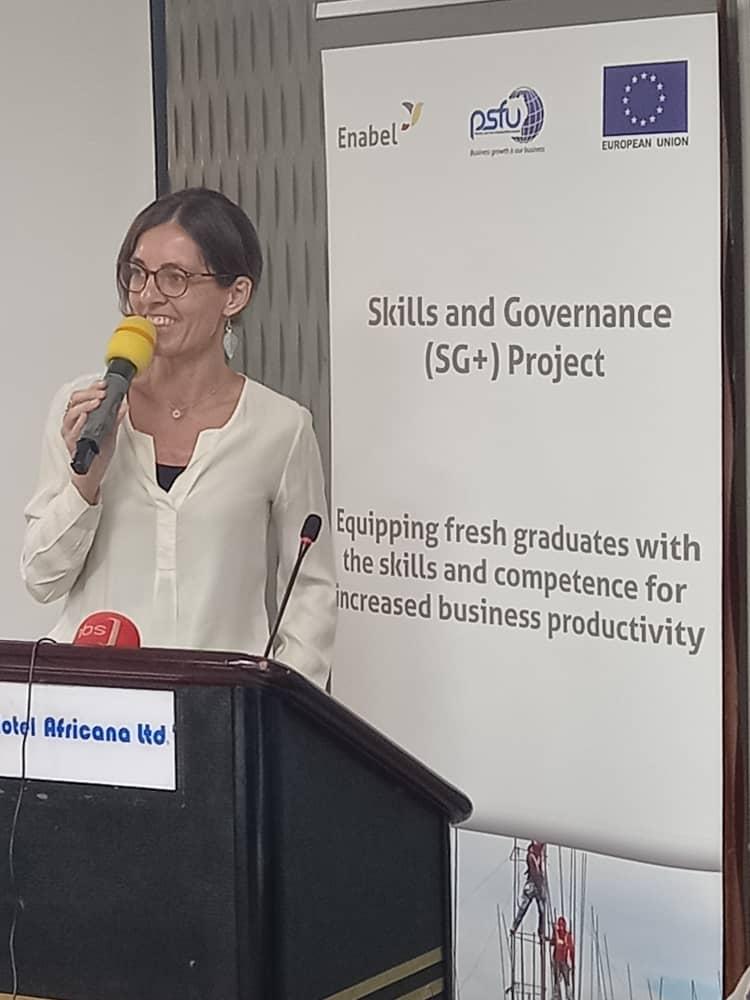
Businesses told to embrace digitalization
Catherine BEKUNDA | 07/04/2022
Ugandan businesses have been asked to embrace digitalization and data integration to improve their business processes. Hallet Virginie, Portfolio Manager, Enabel, made the call during an information-sharing workshop organised by Enabel, the Private Sector Foundation Uganda (PSFU) and the National Information Technology Authority Uganda (NITA U) at Hotel Africana on March 15, 2022.The session was organised under the auspices of the Skills, Attitude, Governance and Anti-Corruption Project (SG+ Project). “The SG+ Project is here to address the two main bottlenecks of conducting business in Uganda; lack of a skilled workforce and then governance and corruption,” explained Virginie. She intimated that in nearly every country Enabel and other development partners come across the same paradox: “the private sector does not find it easy to do business with government resulting from issues such as corruption and limited access to information regarding tenders and procurements.”She added that the SG+ project will greatly improve Uganda's business environment by increasing the supply of qualified workers, establishing private sector-led initiatives to fight corruption and strengthening the private-public sector dialogue. “We encourage homegrown solutions to problems. That is why we are going to build on already existing solutions developed by the government and other partners to improve the business environment. We shall focus on e-procurement, digitalisation and data integration, fostering corporate governance and establishing a private-sector led corruption reporting mechanism,” Virginie emphasised. The SG+ Project is a 5m Euro project funded by the European Union and implemented by Enabel and PSFU. Other organisations such as NITA U and the Public Procurement Disposal Authority (PPDA) support PSFU in specific areas such as Digitalisation, Data integration and E-procurement respectively. This project is expected to devise means to better public governance and service delivery. At the session, Francis Kisirinya, Deputy CEO, PSFU noted that the SG+ Project will improve the competitiveness of the private sector. Dr. Hatwib Mugasa, Executive Director, NITA U said digitalization and data integration will improve Uganda from a peasant nation to a knowledge-based country.“We believe that the private sector is the driving force for this transformation,” Dr Mugasa retorted. “Digitalisation will greatly reduce the cost of doing business and also reduce the barriers that bring corruption by minimizing human interaction in the procurement processes,” concluded Dr Ruth Biyinzika Musoke, project director, PSFU. The event was attended by over 100 representatives from the business sector.
-
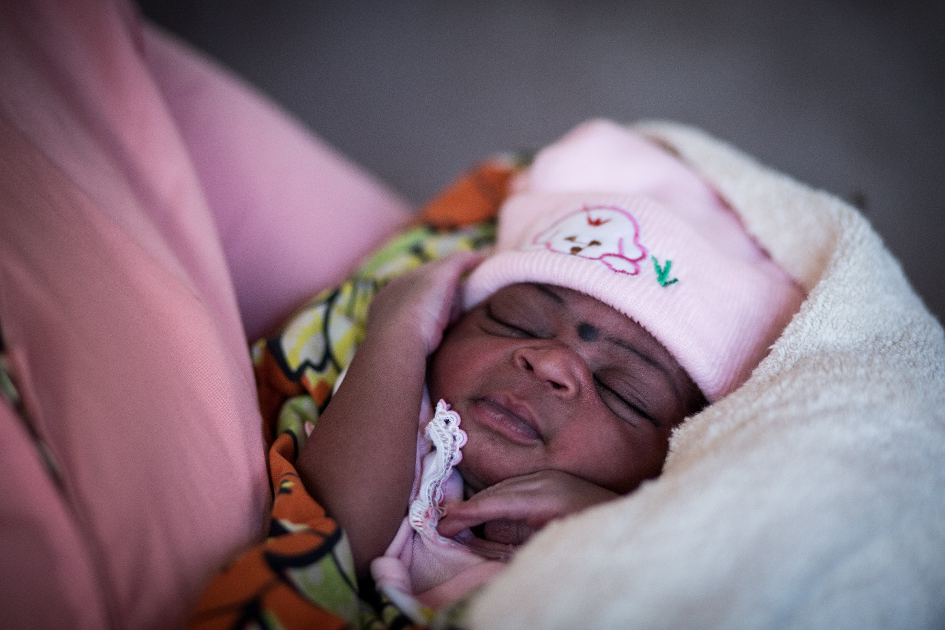
Des bracelets électroniques sauvent les vies des bébés de faible poids de naissance
Reece-hermine ADANWENON | 07/04/2022
Dans le cadre de ses activités dans le domaine de la santé de la mère et de l’enfant, particulièrement pour venir en aide aux enfants de faible poids de naissance, le Programme Santé de Enabel au Benin (P@SRIS) a doté les centres de santé de la zone sanitaire Abomey-Calavi-Sô-Ava de bracelet électronique qui permettent de surveiller l’hypothermie chez ces enfants fragiles. Sur 5995 naissances vivantes (2021), 265 enfants sont nés avec un Faible Poids de Naissance (FPN), 210 ont pu bénéficier de bracelet pour la surveillance des fonctions vitales et 738 visites à domiciles ont été effectuées par les agents de santé pour s’assurer du bien-être de ces bébés. Cette stratégie a permis de réduire considérablement la mortalité néonatale dans la zone sanitaire. En effet le nombre de décès est passée de 81 au 1er semestre 2020 à 26 au 1er semestre 2021 soit une réduction de 68% parmi les enfants de FPN.
-

Enabel et l'union Européenne au Bénin œuvrent pour l’appropriation par les utilisateurs finaux des résultats de recherche
Reece-hermine ADANWENON | 07/04/2022
Conduire une recherche action participative au profit des filières riz et maraîchage est le but du projet TAERA. Pour atteindre ce but, une fois les thématiques co-construites entre les chercheurs et les producteurs, les chercheurs dans une démarche de recherche participative sont revenus ce mercredi 23 mars 2022, au cours d’un atelier d’une demie journée, présenter les protocoles de recherche qui découlent de ces thématiques. Ces présentations ont réuni les élus locaux, les Chefs Cellules Communales des Agences Territoriales de Développement Agricole, les organisations Professionnelles Agricoles, les doctorants des Universités Nationales d’Abomey-Calavi et de Parakou, les chercheurs de l’INRAB, les agrégateurs des clusters riz de la zone d’intervention du projet TAERA.Dans les mois, les années à venir, des recherches seront menées dans la zone d’intervention du projet TAERA c’est-à-dire le Mono et deux communes du Couffo que sont Dogbo et Lalo. Ces recherches qui seront conduites dans une logique de recherche action participative impliquent aussi bien les chercheurs que les producteurs qui sont les utilisateurs finaux des produits de la recherche. Elles couvriront trois ou quatre communes selon les doctorants, mais seront répliquées dans les autres communes par les Organisations Professionnelles Agricoles (OPA/CCR-B et FéNOMa) à travers des Champs école paysan.Au cours de cet atelier de présentation des protocoles de recherche des doctorants, les échanges ont permis de remarquer le grand intérêt des différents acteurs face à la démarche d’une part mais aussi face aux sujets de recherches présentés. Ceci justifie d’ailleurs la présence des maires de toutes les communes partenaires de même que des Agences Territoriales de Développement Agricole (ATDA) 7 et 5, dont dépendent ces communes, à travers leur Chefs Cellules Communales.Cette rencontre marque le début de l’installation des cadres de concertation multi acteurs au niveau local (Mono/Couffo) qui seront animés afin de débattre des problèmes, partager les expériences, les résultats des recherches, etc. Des rencontres semblables seront donc organisées tout au long du projet, au fur et à mesure de l’évolution des expérimentations afin de rester dans la logique de participation et de redevabilité envers les acteurs.
-
Our planet, our health – accepting the interconnectedness
Agnes KABAIKYA | 07/04/2022
Understanding our health today calls for appreciating the interaction of human activities with our physical environment, meaning there is a thin connection between health, environment (pollution, deforestation, climate change and globalisation. In fact, human actions of pollution, deforestation and globalisation have become a serious threat to our health and our wellbeing. Today the most common illnesses affecting child mortality (malaria, diarrhea respiratory infections and malnutrition) are caused by the lack of a clean environment, clean water, clean air, enough uncontaminated nutritious food and human actions. Relatedly, the high prevalence of non-communicable and chronic diseases among middle aged population (cancer, heart diseases, mental health) are also related to the environment. Safeguarding environmental damage, a prerequisite to good health and well-being Preventing, limiting and managing environmental damage is the best option of protecting individuals and the population against advance consequences/negative impacts of environment vulnerability. Today government and developmental institutions/agencies have realised the interconnectedness of a clean environment to good health and therefore are devising mitigation measures to reducing and reversing its impact. I have seen institutions through their workforce engage in clean days or tree planting. This is meant to show that everything we do at the end has a link with our health. When we plant trees, we have clean fresh air free of diseases, we receive interrupted rainfall which enables us plant our crops, our food on time. And when we have enough, nutritious food, there is a likelihood, we will not have malnutrition, we will have less people falling sick and thus a healthy population. A healthy population at peace with its environment is a healthy population. Let us strive maintain a healthy environment for an enhanced quality of life, by creating safer conditions around our homes and our work places. Let the population access the needed health care services by removing barriers and disparities of inadequate infrastructure, unavailable essential medicine and supplies and the unmotivated health work force that impede the poor from accessing quality health service.
-
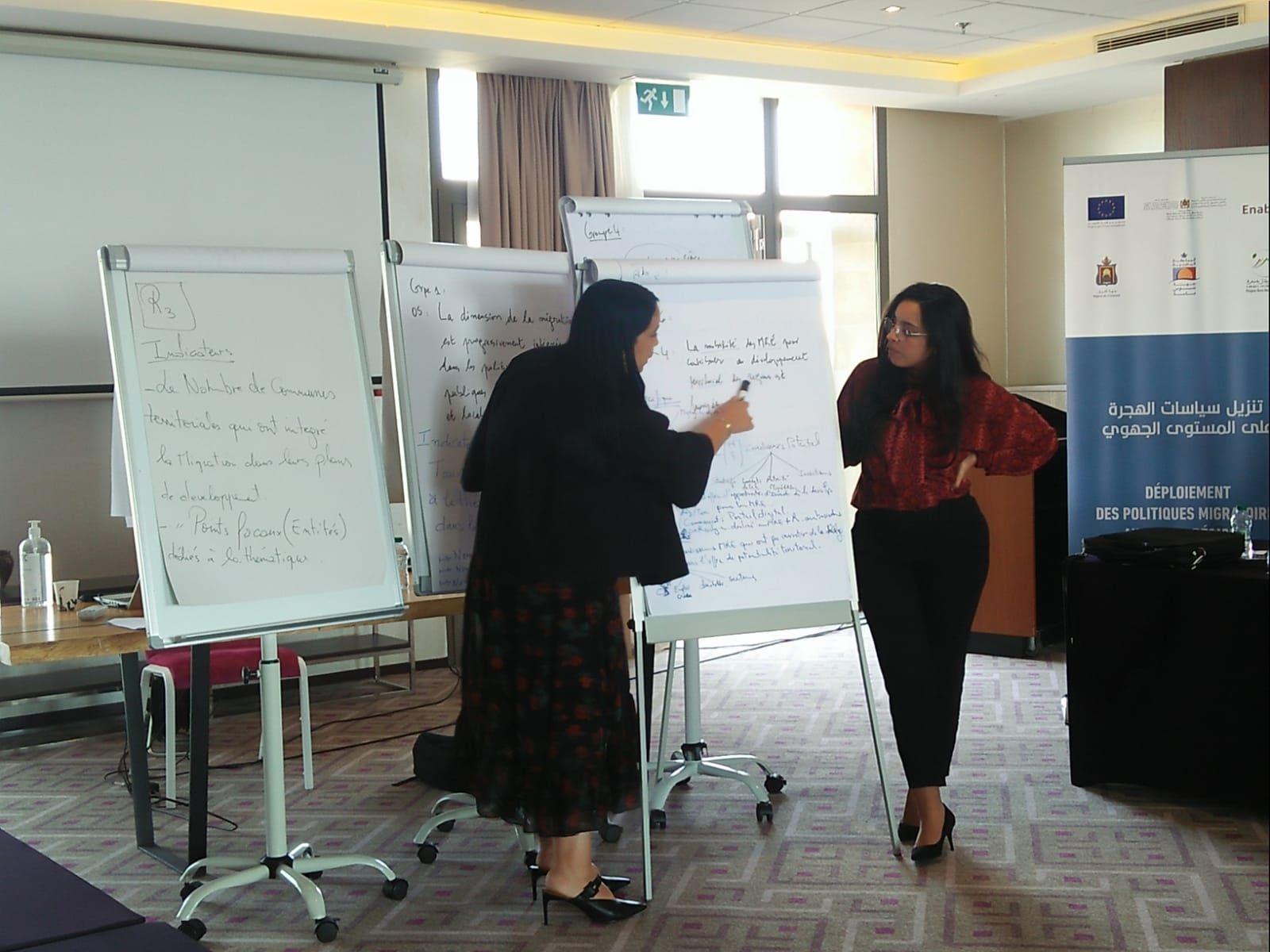
Maroc: Renforcement des capacités en Gestion Axée sur les Résultats (GAR) des acteurs clés de la migration
Nazha BOUJDADI | 06/04/2022
Dans une volonté de renforcer les compétences de ses partenaires, le projet Déploiement des Politiques migratoires au niveau régional-DEPOMI a organisé quatre formations-action de trois jours portant sur la Gestion axée sur les Résultats (GAR) : planification opérationnelle, suivi-évaluation et gestion des risques selon la vision d’Enabel. Les formations, qui ont eu lieu durant les semaines du 12 au 14 octobre à Taghazout (Souss-Massa), du 27 au 29 octobre à Bin el Ouidane (Béni Mellal-Khénifra), du 2 au 4 novembre à Saadia (Oriental) et du 14 au 16 décembre 2021 à Rabat (Rabat-Salé-Kénitra), ont touché 87 cadres, dont 43 femmes, occupant divers niveaux de responsabilité dans les Wilayas, les Conseils des régions, les provinces des trois régions où intervient le projet DEPOMI, le milieu de l'enseignement supérieur et de la recherche, les secteurs de l'éducation et de la santé, les Centres régionaux d'Investissement (CRI), l'Agence nationale de la Promotion de l'Emploi et des Carrières (ANAPEC), les organisations de la société civile, les autres programmes travaillant sur la thématique de la migration et mis en œuvre au niveau des trois régions-cibles, ainsi que le Département des Marocains résidant à l’Etranger du Ministère des Affaires étrangères, de la Coopération africaine et des Marocains résidant à l’étranger. Ces formations, en plus du renfort des compétences des partenaires du projet et de leur outillage pour mieux suivre les opérations des projets, ont également contribué à une meilleure mise en œuvre et à un suivi efficace du projet DEPOMI. A la fin des formations, les participants ont déclaré disposer d'une compréhension partagée des concepts ayant trait au suivi-évaluation et posséder les principaux outils de la GAR comme la matrice de monitoring, le plan de travail ou le plan de gestion des risques. Pour rappel, DEPOMI est financé par l’Union européenne et mis en œuvre par Enabel, en partenariat avec le Ministère des Affaires étrangères, de la Coopération africaine et des Marocains résidant à l’étranger.
-
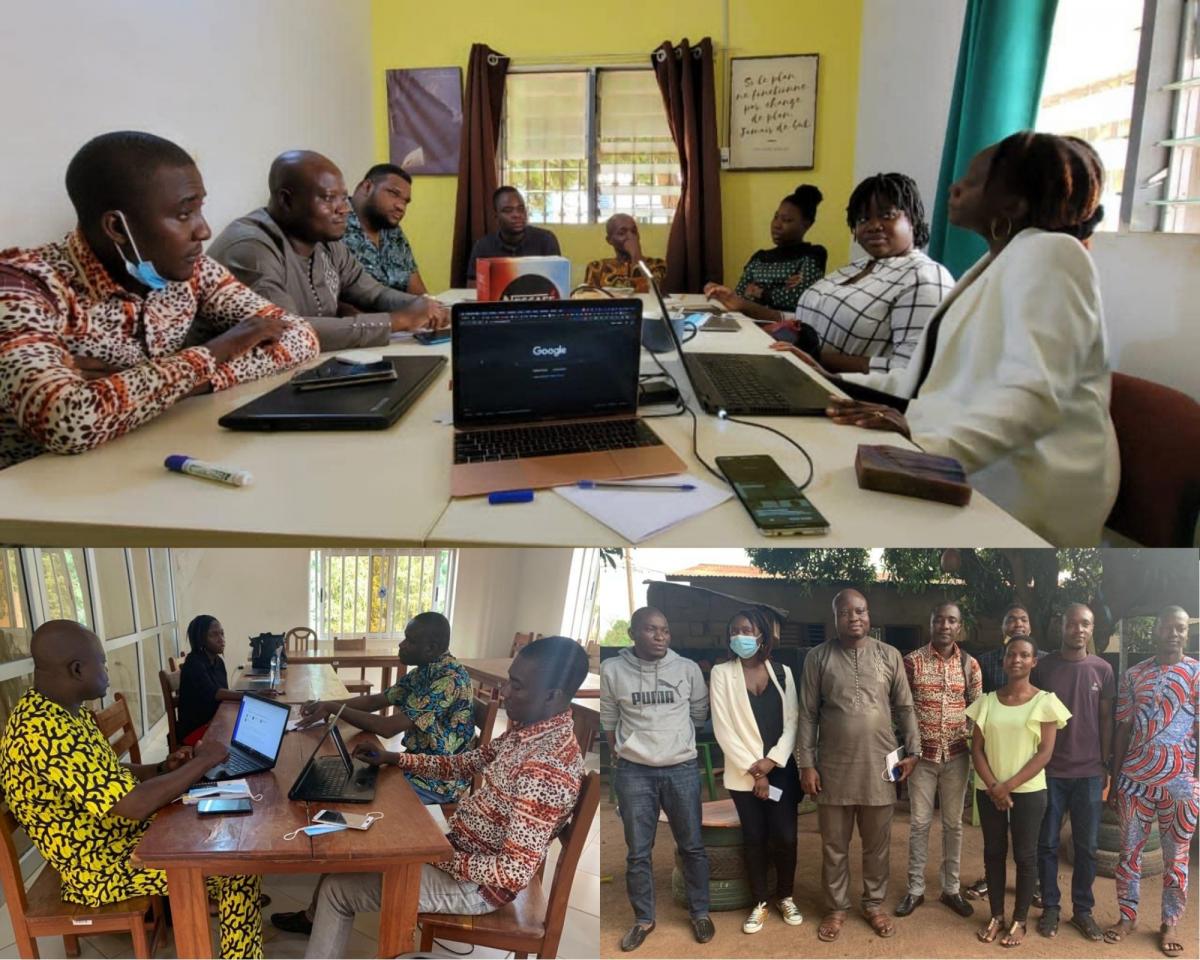
L’équipe de Gestion du projet DigiBoost au contact des SAEI
Reece-hermine ADANWENON | 06/04/2022
Après 24 mois de mise en œuvre des activités du projet, Emmanuelle Bouiti et son équipe sont allés à la rencontre des bénéficiaires afin de s’enquérir des grandes actions entreprises pour la restructuration des Structures d’Accompagnement à l’Entreprenariat Innovant (SAEI) mais pour également recueillir leurs doléances afin d’améliorer le partenariat existant.Du 15 au 19 mars 2022, l’équipe de gestion du Projet s’est rendue dans les localités de Lokossa, Savalou, Bohicon et Parakou où elle a pu rencontrer un certain nombre de SAEI. Parmi ceux-ci figurent : BeniLab, Cens, Guerra Tech, Je veux Briller, Waxangari Lab, Odace Soft, Centre de Développement de l'Entrepreneuriat de l'Université de Parakou, EtriLabs Parakou, ABED ONG et MIMES SERVICES. Au terme des fructueux échanges, les différents responsables de ces structures sont tous restés unanimes sur l’importance des formations reçues par les experts d’Enabel et des autres partenaires du projet DigiBoost. En effet, grâce aux compétences acquises, les différentes structures disposent désormais des outils nécessaires pour se professionnaliser et s’affirmer davantage dans une posture de SAEI au sein de l’écosystème numérique béninois. Selon la SAEI Je veux briller, « Avant, on mettait toutes les startups ensemble sans un programme bien défini et pas personnalisé. Mais avec les formations qu'on a reçues d'Enabel à travers le projet DigiBoost, nous avons pu restructurer nos offres ». De plus, « avant, on n’était dans tout et dans rien, c'est grâce au projet DigiBoost que nous avons su qu'il fallait restructurer notre SAEI. Cet appui nous a permis de clarifier notre positionnement’’.Pour la SAEI Wassangari Lab, « les formations d'Afric'Innov et les séances de travail avec les experts, ont permis à sa structure de se rendre compte de l'urgence de se professionnaliser. Cela nous a amené à comprendre les questions d’ordre juridiques et fiscales qui s’imposent à nous. Ces formations nous ont également permis de comprendre qu'on n'avait pas encore totalement la posture d'une SAEI, mais nous disposons aujourd'hui des outils qui nous permettront de nous affirmer dans ce sens ».Selon un des responsables du Centre de Développement de l'Entrepreneuriat de l'Université de Parakou, « le programme d'anglais dont nous avons bénéficié grâce au Projet DigiBoost est d’une importance capitale, car il nous a permis de découvrir de nouvelles notions ».Au terme de la tournée, l’équipe a été très impressionnée de constater l’impact positif que le projet DigiBoost a eu sur la structuration et les partenariats qui sont nés entre les SAEI.
-
Enabel donates 3 state-of-the-art ambulances to Amuru, Omoro and Nwoya districts
Agnes KABAIKYA | 05/04/2022
The Belgian Development Agency, Enabel through her Enabling Health in Acholi (EHA) Project with funding from USAID, has donated 3 state-of-the-art ambulances to the Ministry of Health for the districts of Amuru, Omoro and Nwoya. Tom Vanneste, the Enabel in Uganda Resident Representative handed over the ambulances to Dr. Jane Ruth Aceng, the health Minister at the Ministry of Health headquarters today. The over 850 million worth ambulances have been refurbished and equipped to the recommended specifications for Type B ambulance as per latest MOH guidelines, meaning they are able to provide basic life support services like oxygen therapy, nebulization, monitoring of vital parameters and automatic external defibrillation. The equipping and upgrade was, for the first time, locally implemented in close collaboration with the MOH Emergency Medical Services (EMS) and the engineering department. The ambulances are expected to transport acutely ill and injured patients both from the community and from lower level facilities to hospitals which can handle them, and these in addition to a few in the region will avert unnecessary deaths happening due to delayed or missing emergency services. The most common emergency situations happening in communities include maternal emergencies, children with acute illnesses and road traffic accidents. In the Acholi region an assessment showed that there are few functional ambulances and the available ones are not properly equipped, prompting the Enabling Health in Acholi Project (EHA) to purchase 3 new vehicles and equip them as per the Ministry of Health latest standards. A function emergency system requires a lot of coordination and communication at the scene, recognition of the emergency, transport with an appropriate vehicle and care during transport, and emergency care at the receiving facilities, similarly the facilities have to ensure availability of appropriate equipment, staff and medicines for treating the emergencies. The National EMS Policy 2021 sets clear standards and guidelines for establishing regional based coordination systems and fully functional ambulances as one component of the EMS system. There is need for the districts and facilities to ensure maintenance and running costs, and establishing the regional coordination system as per MOH policy. Enabel, the Belgian development agency implementing and coordinating the Belgian international development policy in Uganda, has been supporting the public health system for several years, including the emergency and referral services, and will continue to work with the hospitals and districts to ensure acutely ill patients receive appropriate health care.
-
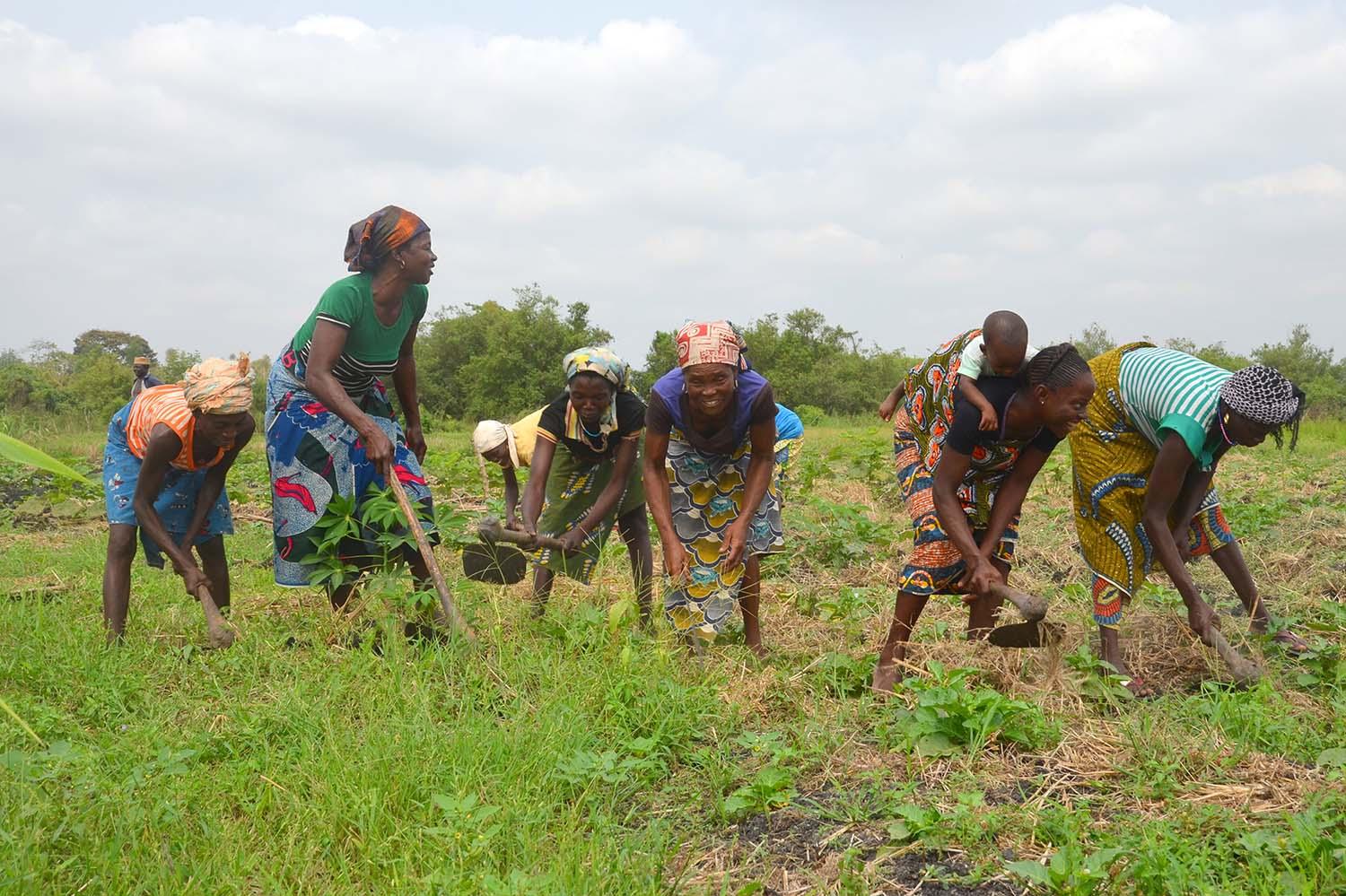
Enabel et l’Union Européenne contribuent à la mise en place du Premier cadre de concertation des acteurs de la filière Riz
Reece-hermine ADANWENON | 05/04/2022
Contribuer fortement à la mise en place d’un dispositif de concertation entre les acteurs de la recherche, les institutions en charge du conseil agricole, les organisations paysannes agricoles et les acteurs des filières est l’un des objectifs du projet TAERA (Transition Agro-Ecologique par la Recherche Agricole) financé par l’Union Européenne et mis en œuvre par Enabel au Bénin. La co-organisation des cadres de concertation filière comme celui de la filière riz est un moyen pour le projet de parvenir à ce but. Pour cela, TAERA a fortement encouragé et soutenu l’organisation du premier cadre de concertation de la filière Riz dans le pôle 7 depuis l’avènement des pôles de développement agricole. Cette rencontre s’est tenue les 15 et 16 décembre 2021 et a réuni différents acteurs tels que l’Agence Territorial de Développement Agricole, les Organisations Paysannes Agricoles, les chercheurs de l’INRAB et des Universités Nationales conviées par TAERA mais aussi les autorités communales. La promotion des filières agricoles phares est l’action qui donne le ton aux buts des Agences Territoriales de Développement Agricole (ATDA) depuis les réformes du secteur agricole béninois. Contrairement aux filières prioritaires du Pôle 7 pour lesquelles l’ATDA est à la 4e année d’organisation de cadre de concertation, la filière riz, filière de diversification dans le pôle, n’a jusqu’ici, bénéficié de l’organisation d’aucun cadre de concertation des acteurs la composant. Ce cadre tombe donc à point nommé pour lancer la dynamique des concertations afin d’assurer la synergie, la complémentarité et la cohérence des interventions de tous les acteurs des différents maillons. In fine, cet acquis aboutira à un bon suivi de la mise en œuvre des actions de promotion de la filière riz dans le Pôle 7. Le projet TAERA, fidèle à ses objectifs, a facilité la participation des acteurs de la recherche à ce premier cadre de concertation. Il s’agit des Universités Nationales d’Abomey-Calavi et de Parakou de même que l’Institut National de Recherche Agricole du Bénin (INRAB), tous partenaires du projet. Ces acteurs qui n’étaient pas présents dans les cadres de concertation habituels, sont désormais à l’écoute des clients de la recherche et peuvent aussi diffuser les avancées qu’ils font dans le domaine de la recherche dans la filière. Après les mots de bienvenues du représentant du Directeur Général de l’ATDA 7, Monsieur Benoît joseph ADIKAN, les deux jours de rencontre ont été ouverts par Madame Loubatou SAKA, représentant le Directeur de la Programmation et de la Prospective (actuel Planification, de l’Administration et des Finances) du Ministère de l’Agriculture, de l’Elevage et de la Pêche. Elle a apprécié la qualité des participants à cet atelier, s’est dite rassurée par conséquent de la qualité des résultats qui en découleront avant d’exhorter les participants à l’assiduité au cours des travaux. Ces deux jours de travaux ont permis aux participants de prendre connaissance de la définition et de l’utilité d’un plan de campagne agricole, du niveau de mise en œuvre et d’atteinte des objectifs de production du plan de campagne agricole riz 2021-2022 et de la planification de la campagne agricole 2022-2023 de la filière riz à l’ATDA. Ils ont également permis un brassage entre les acteurs, le tissage de liens pour des collaborations futures plus faciles. A travers les différentes présentations, les chercheurs ont été en contact avec les réalités de la filière et les autres acteurs ont été informés des projets et avancées de la recherche sur la filière. Un bon canal de communication des problèmes, de diffusion des solutions, de partage d’expériences vient de ce fait d’être établi
-

Enabel contribue à la validation technique du Plan SAR Maritime du Bénin
Reece-hermine ADANWENON | 05/04/2022
Procéder à la validation des améliorations apportées sur le projet de plan de Sauvetage Recherche en Mer (SAR) maritime du Bénin et d’assurer son appropriation par les parties prenantes de même que les concepts associés. C’est l’objectif de l’atelier de validation et d’appropriation du Plan SAR Maritime du Bénin organisé par le Projet d’appui au développement du secteur (para) portuaire (PASPort) mise en œuvre par Enabel au Bénin. Démarré depuis 2020, l’actualisation et l’élaboration dudit document a connu son épilogue en novembre 2022. Grâce à son Plan opérationnel, le Bénin se conforme aux exigences de la convention internationale sur la recherche et le sauvetage maritimes dénommée SAR (Sea Assistance and Rescue) dont elle a procédé à la ratification le 8 Février 2017. A l’instar d’autres endroits du monde, il s’exerce dans l’espace maritime du Bénin, diverses activités socio-économiques telles que le transport maritime, la pêche artisanale, la pêche industrielle, la recherche pétrolière, les opérations de transbordement, etc. Ces activités évoquées présentent des risques d’incidents et d’accidents de diverses natures pouvant nécessiter une assistance d’urgence de sauvetage comme l’évacuation de passagers ou d’équipages de navires en détresse, de personnes accidentées ou de survivants d’un accident, ainsi que l’assistance à des navires ou barques en détresse.
